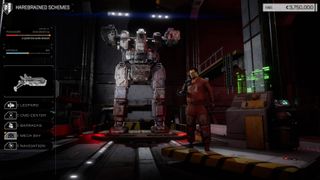Half the battle in BattleTech is paying the bills
Our first hands-on with BattleTech's singleplayer campaign reveals a unique internal structure.
Above: Raw gameplay footage of a base capture campaign mission I played.
If all of your pilots die in BattleTech, you don't lose. It's a big setback for your mercenary company, but hey, there's always more procedurally-generated mechwarriors willing to jump into the cockpit for cash.
If all of your mechs die in BattleTech, you also don't lose. It's a massive setback, or as game director Mike McCain tells me, "Losing an entire mech is an order of magnitude worse than losing a mechwarrior." Still, even if all your hardware gets blown up by lasers you can still take out a loan, buy some more mechs, and try to grind a few missions to pay off your debt. "People are easier to replace than the mechs, as horrible as that sounds," says McCain.
BattleTech's only loss condition is bankruptcy. As the leader of a mercenary outfit, your focus in the singleplayer campaign is on helping an ousted leader, Lady Kamea Arano, to liberate her people. But as you're lining up long-range missile shots against Arano's enemies, you'll also have to consider the economics of running a freelance team of pilots, mechanics, and medics and keeping your mechs, equipment, and ship in shape.

Inside your spaceship, the Argo, there's a room past the MechBay, navigation console, and other stations where you can examine your budget. Here, everything gets tallied up: the cost of ship upgrades, mech upkeep, and pay for your pilots, doctors, and mech technicians. It's not a granular, sim-like Excel sheet or anything—for example, you set a single, shared pay rate for all your pilots, rather than typing out salaries for each character.
But unlike other games in the genre, like XCOM 2, nearly everything in BattleTech costs credits. Repairing your mechs. Moving your ship on the galactic map. Even using a hyperjump costs extra, like passing through a cosmic tollbooth. Worrying about your bottom line might encourage you to build mechs that don't expend lots of ammo, because every missile or autocannon round you fire in BattleTech costs money to replace. If you're low on funds or underpaying your MechWarriors, you'll also encounter a set of special events on the Argo.
You'll also have to weigh pay against salvage and your reputation with the factions you take missions from. In a 'negotiation' phase before each mission, you have a chance to set how many credits and how much salvage you'd like to earn. Demand less salvage and less pay, and you'll earn more reputation, a resource that will ultimately drive factions to trust you with harder jobs, or offer discounts at stores on planets they control.
Comic deals, prizes and latest news
Sign up to get the best content of the week, and great gaming deals, as picked by the editors.

Staying in the black
Although economic judgments are woven into BattleTech, managing your finances isn't meant to be punishing. "We don't intend this kind of financial failure to be constantly looming over your Mercenary career at every step," explains McCain. "The game is about growing your mercenary company, and helping the Restoration to liberate her people. Financial ruin should lurk in the distance—and incentivize players to improve their management efforts if it catches up to them—but the game isn't designed to be a constant battle for financial solvency."
As McCain says, you'll be warned well in advance if you're running low on credits. "We want to provide plenty of opportunities for the player to recover—whether by firing some MechWarriors, paying your crew less, selling off extra Mechs and gear, taking out a loan, or taking more challenging and lucrative contracts," he says.
What's interesting to me about the way BattleTech treats money is the way it influences the game's structure. Because bankruptcy is the only way your mercenary career can end, you can actually fail the main questline of the campaign and still continue playing, taking missions from other factions.

That main questline has you fighting on behalf of Lady Arano, leader of the Arano Restoration. She's been driven out of power by an authoritarian group known as The Directorate, led by her uncle. You'll probably want to help her out—not only will you miss out on the game's biggest story beats, but the Restoration pays really well, Harebrained Schemes tells me. If you do choose to ignore these "Restoration Missions," you'll see more and more planets swallowed up by the Directorate on BattleTech's galactic map. "If the story campaign is lost, the Restoration is extinguished and all Directorate-controlled planets become travel-able—and the Directorate becomes a possible client for mercenary missions in the game," says McCain.
In short: if you let the bad guys win, you can start working for them. Don't expect a bespoke 'Directorate campaign' to spring out of the ground if this happens, but it's still neat and unexpected that BattleTech's campaign structure is this malleable. "It's a significantly a bigger game than our Shadowrun games," says McCain, and then studio co-founder Mitch Gitelman, laughing, takes it a step further: "'Significantly' is an understated word. This is the biggest, most complex game we've ever made as a studio."

Harebrained Schemes isn't comfortable estimating how long a campaign will take to complete for an average player, from the hour I spent with it, BattleTech reads as a strategy RPG that you'll be able to grind pretty freely, taking procedurally-generated assassination, escort, base defense, base attack, or capture missions from the other factions that populate the map.
And while mod tools are off the table for the studio, that doesn't mean that BattleTech won't have any mods at all. "We are not offering mod support. We are also doing nothing to prevent it," says McCain.
I need to spend a full day or two with it to see how BattleTech's systems fit together, but my hope is that they congeal into something less like XCOM with robots, and more like a dynamic tabletop campaign made digital.

Evan's a hardcore FPS enthusiast who joined PC Gamer in 2008. After an era spent publishing reviews, news, and cover features, he now oversees editorial operations for PC Gamer worldwide, including setting policy, training, and editing stories written by the wider team. His most-played FPSes are CS:GO, Team Fortress 2, Team Fortress Classic, Rainbow Six Siege, and Arma 2. His first multiplayer FPS was Quake 2, played on serial LAN in his uncle's basement, the ideal conditions for instilling a lifelong fondness for fragging. Evan also leads production of the PC Gaming Show, the annual E3 showcase event dedicated to PC gaming.
Most Popular



